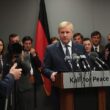The German government’s potential delay in implementing the EU’s stringent AI Act is drawing criticism and underscores a growing debate about Europe’s ability to foster innovation while navigating the complex regulatory landscape of artificial intelligence. Klaus Müller, President of the German Federal Network Agency (Bundesnetzagentur), warned that a lack of clarity in AI regulations risks hindering Europe’s ambition to be a global leader in the field.
Speaking to the “Neue Osnabrücker Zeitung”, Müller emphasized the urgency of establishing clear rules, stating that uncertainty in the market is detrimental to securing Europe’s strategic position in AI development. The government’s proposal to postpone the rollout of the AI Act’s highest security levels by a year, ostensibly to allow for standardization, highlights a tension between cautious regulation and the need for agility in a rapidly evolving technological environment.
While acknowledging the government’s reasoning regarding standardization, Müller stressed that a prolonged implementation period should be leveraged to facilitate practical application rather than simply delaying critical oversight. The Bundesnetzagentur, responsible for enforcing the AI Act in Germany, is acutely aware of the delicate balance required.
Concerns have been raised that the AI Act, with its detailed classification and stringent requirements, might stifle creativity and innovation, effectively “fettering creative minds”. However, Müller sought to alleviate these anxieties, citing initial assessments suggesting most businesses do not fall under the Act’s highest-risk categorization. He characterized fears of excessive bureaucracy as largely unfounded, noting that “transparency rules” often suffice for the vast majority of AI systems.
The discussion also extends to Europe’s capacity to compete with U.S. tech giants in the realm of large language models. While encouraging German companies to explore and develop AI-driven solutions, Müller remained cautiously optimistic about the prospect of a European “ChatGPT” equivalent. He noted that the viability of such an endeavor hinges on developing sustainable and promising business models, a challenge that remains largely unanswered. The underlying question is whether Europe can foster a regulatory environment that allows for innovation without conceding a decisive technological advantage to its competitors.





